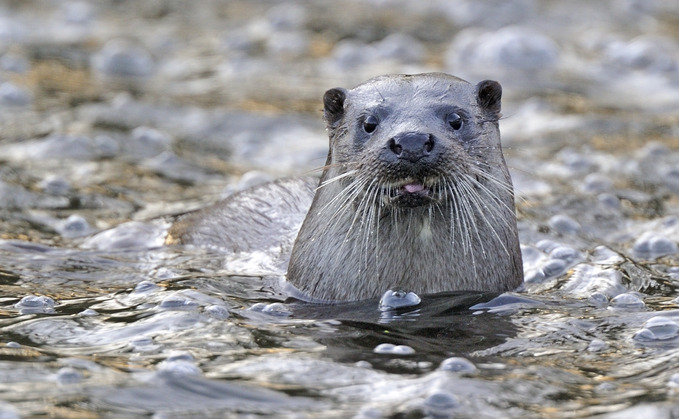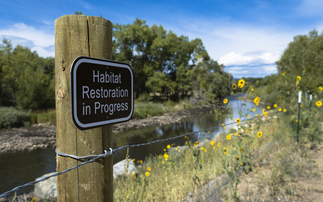Otters among wildlife being harmed by toxic chemicals | Credit: Andy Rouse
Wildlife and Countryside Link warns chemicals are polluting waters, soils, food and wildlife, as it calls for a revamped national chemical strategy
Political parties have faced fresh calls to toughen up regulations of toxic chemicals, with environmentalists warning "the sleeping giant of pollution" is causing huge damage to the environment, wildlife, and human health.
That is the headline warning of a new report published today by environmental coalition Wildlife and Countryside Link.
Alongside the report it published test results of an experiment showing toxic chemicals were found in the hair and blood of 17 UK politicians and environmentalists, including Philip Dunne, Alex Sobel, Caroline Lucas, Baroness Bakewell of Hardington Mandeville, Ben Goldsmith, Henry Dimbleby, Beccy Speight CEO of the RSPB, and Craig Bennett CEO of The Wildlife Trusts.
Results showed participants in the experiment tested positive for multiple Per- and polyfluoroalkyl substances (PFAS) known as 'forever chemicals', endocrine hormone-disrupting 'everywhere chemicals' and heavy metals, with some "very high" levels of individual hazardous chemicals in multiple samples.
While the authors of the report acknowledged the study only provides a small snapshot of the prevalence of such chemicals, it suggested UK citizens could potentially face higher levels of contamination from some pollutants when compared with other countries.
Chromium, mercury, and multiple phthalate and Bisphenol-S (BPS) 'everywhere chemicals' were found at considerably higher levels compared to other studies, the report found.
"Toxic chemicals are a sleeping giant of pollution," warned Philip Dunne, former Chair of the Environmental Audit Committee. "We need to understand how these chemicals are polluting our waters, soils, food and wildlife and the knock-on impact this could have on our own bodies.
"That is why I was keen to take part in Wildlife and Countryside Link's research into toxic chemical pollution in our bodies."
The report explained these toxic chemicals are found in common consumer goods including plastic food packaging, toys, toiletries, and cosmetics, and end up in the food and water consumed in the UK.
All the chemicals have been linked by scientists to "significant human health impacts" the report warned, including increased kidney, testicular, lung and breast cancer risk; hormone and immune system disruption; reduced fertility; and developmental issues.
The report highlighted how chemicals are also impacting ecosystems, with not a single English river deemed to be in 'good' chemical health, with toxic chemicals found in more than 1,600 UK river and groundwater sites.
Pollution is having a detrimental impact on UK wildlife with insects, birds of prey, otters, whales, and dolphins all being harmed by toxic chemicals, with effects such as reduced reproduction, growth, and development.
The report highlights how the UK government promised consumer and environmental protections would be strengthened, not weakened, as a result of the UK's departure from the EU.
But it warns the UK is now "falling behind" its neighbours in terms of legal protections against toxic chemicals.
While the EU and USA have introduced or tabled new PFAS standards and banned multiple harmful chemicals for use, the UK has introduced no bans in the last three years, the report states.
Drinking water and food packaging chemical controls are being toughened in the US and EU while the UK continues to have weaker thresholds and allows hazardous chemicals in food contact materials, it added.
Environmental groups are now calling on UK politicians to introduce new protections, including removing the most hazardous chemicals from sale and use. Specifically, campaigners are calling for a ban on PFAS and endocrine disruptors for all but essential uses.
It also calls for toxic chemicals to be regulated as groups and for their dangerous impact to be assessed before any new chemicals are allowed on the market.
Chemical policymaking and regulation should be effectively funded to ensure the six year delay to the UK Chemicals Strategy and National Action Plan on the Sustainable Use of Pesticides is not repeated, the report added.
It also suggests the UK should align with the EU's REACH regulatory regime as a minimum baseline for strong UK chemical regulation, which would enable the regulator to focus limited capacity on priority areas.
Moreover, the report calls for improved monitoring systems to assess chemical impacts on rivers, seas and soils.
"We usually can't see, smell or taste them, but toxic chemicals are a growing threat to the health of UK rivers, the food industry, public health and the natural world," said Dr Richard Benwell, chief executive of Wildlife and Countryside Link.
"The incredible scale of chemical contamination makes this the sleeping giant of pollution, with this research a startling reminder of the worrying level of chemical contamination in our bodies," he added.
"The UK's consumer and environmental protections were long ago outpaced by the massive rise in chemical pollution and now this country is falling further behind. The government should take the most harmful chemicals off the shelves and out of our lives and stop the build-up of toxic chemicals in our environment."








